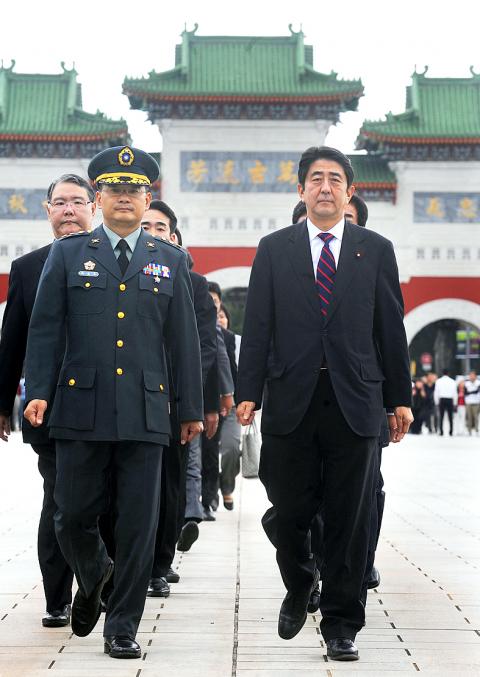President Ma Ying-jeou (馬英九) yesterday shunned issues relating to the contested Diaoyutai Islands (釣魚台) during his meeting with former Japanese prime minister Shinzo Abe.
Abe arrived in Taipei yesterday on the inaugural flight from Tokyo’s Haneda Airport to Taipei International Airport (Songshan). Eyes were on his meeting with Ma and whether they would touch on issues related to the island chain in the East China Sea claimed by China, Taiwan and Japan.
During a trip to the US earlier last month, Abe used a Nazi-era term to accuse China of pursing a modern-day policy of lebensraum with its growing assertiveness over disputed territories.

PHOTO: LIAO CHEN-HUEI, TAIPEI TIMES
Lebensraum, or “living space,” was a key tenet in the philosophy of Adolf Hitler who believed that Germany deserved space, especially in eastern Slavic areas, in which to grow.
Beijing and Tokyo have been embroiled in a bruising diplomatic row since early September, when Japanese authorities arrested the captain of a fishing trawler near the islets known as Diaoyutais in Taiwan and China and Senkaku in Japan. The Ma government said earlier this month that there was no need to object to China’s territorial claim to the -Diaoyutais since the -Republic of China (ROC) -Constitution states that China is still considered a territory of the ROC on Taiwan. This prompted concerns from Japanese officials over the political implications of this interpretation.
Ma avoided the contentious issue yesterday and instead focused on the resumption of direct flights between Taipei and Tokyo.
Describing Abe as “the ROC’s best friend,” Ma said Abe was the third generation of his family to have close ties with the ROC.
The resumption of flights between Songshan and Haneda was an important indication of improved Taiwan-Japan relations over the past two years, Ma said.
Aside from paying a visit to former president Lee Teng-hui (李登輝), Abe also visited the Martyrs’ Shrine (忠烈祠) where people who died in the state’s service are enshrined.
When asked by the press why he chose to pay a visit to the shrine, Abe said through a translator that people who sacrificed their lives for their country all deserved to be honored. When further pressed by the reporters whether he knew the shrine also honored anti-Japan martyrs, Abe did not answer as the accompanied translator did not translate the question.
Lee affirmed Abe’s shrine visit, saying it was a show of respect for the country.
ADDITIONAL REPORTING BY AFP AND STAFF
writer

Intelligence agents have recorded 510,000 instances of “controversial information” being spread online by the Chinese Communist Party (CCP) so far this year, the National Security Bureau (NSB) said in a report yesterday, as it warned of artificial intelligence (AI) being employed to generate destabilizing misinformation. The bureau submitted a written report to the Legislative Yuan in preparation for National Security Bureau Director-General Tsai Ming-yen’s (蔡明彥) appearance before the Foreign Affairs and National Defense Committee today. The CCP has been using cognitive warfare to divide Taiwanese society by commenting on controversial issues such as Taiwan Semiconductor Manufacturing Co’s (TSMC, 台積電) investments in the

HELPING HAND: The steering committee of the National Stabilization Fund is expected to hold a meeting to discuss how and when to utilize the fund to help buffer the sell-off The TAIEX plunged 2,065.87 points, or 9.7 percent, to close at 19,232.35 yesterday, the highest single-day percentage loss on record, as investors braced for US President Donald Trump’s tariffs after an extended holiday weekend. Amid the pessimistic atmosphere, 945 listed companies led by large-cap stocks — including Taiwan Semiconductor Manufacturing Co (TSMC, 台積電), Hon Hai Precision Industry Co (鴻海精密) and Largan Precision Co (大立光) — fell by the daily maximum of 10 percent at the close, Taiwan Stock Exchange data showed. The number of listed companies ending limit-down set a new record, the exchange said. The TAIEX plunged by daily maxiumu in just

INVESTIGATION: The case is the latest instance of a DPP figure being implicated in an espionage network accused of allegedly leaking information to Chinese intelligence Democratic Progressive Party (DPP) member Ho Jen-chieh (何仁傑) was detained and held incommunicado yesterday on suspicion of spying for China during his tenure as assistant to then-minister of foreign affairs Joseph Wu (吳釗燮). The Taipei District Prosecutors’ Office said Ho was implicated during its investigation into alleged spying activities by former Presidential Office consultant Wu Shang-yu (吳尚雨). Prosecutors said there is reason to believe Ho breached the National Security Act (國家安全法) by leaking classified Ministry of Foreign Affairs information to Chinese intelligence. Following interrogation, prosecutors petitioned the Taipei District Court to detain Ho, citing concerns over potential collusion or tampering of evidence. The

‘COMPREHENSIVE PLAN’: Lin Chia-lung said that the government was ready to talk about a variety of issues, including investment in and purchases from the US The National Stabilization Fund (NSF) yesterday announced that it would step in to staunch stock market losses for the ninth time in the nation’s history. An NSF board meeting, originally scheduled for Monday next week, was moved to yesterday after stocks plummeted in the wake of US President Donald Trump’s announcement of 32 percent tariffs on Taiwan on Wednesday last week. Board members voted to support the stock market with the NT$500 billion (US$15.15 billion) fund, with injections of funds to begin as soon as today. The NSF in 2000 injected NT$120 billion to stabilize stocks, the most ever. The lowest amount it